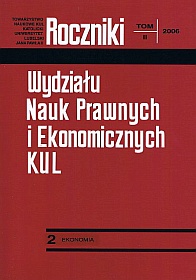The Beginning of Constitution of the Notion of Intellectual Intuition
Abstract
The article undertakes the matter of the existence and the part of the intellectual intuition in the cognition of the reality at Heraclitus from Ephesus. It explains the specificity of the understanding of the intellectual intuition in the connection from Heralitus the understanding of the being, shows the role of intuition in the recognition of the reality. The analyses are led according to questions: What is the act of the intuition? What is the object of the intuition? What is the subject of the intuition? Heraclitus binds the understanding of the intuition with the „phronesis”. The characteristic moments of the act of “fronesis”: internal insight, visuality, intellectuality. The intuition is indispensable to reading of the solid Law – Logos.
References
Barnes J., The Presocratic Philosophers, I, London 1979.
Burnet J., Early Greek Philosophy, London 1892, 19304.
Chudy W., O naoczności poznania metafizykalnego, „Roczniki Filozoficzne” 31(1983) z. 1, s. 5-40.
Dłubacz W., U źródeł koncepcji Absolutu. Od Homera do Platona, Lublin 2003, 120-132.
Fattal M., Le logos d’H.: un essai de traduction, „Revue des études grecques” 99 (1986), s. 142-152.
Gajda J., Teoria wartości w filozofii przedplatońskiej, Wrocław 1992.
Gennaro I. De, Logos – Heidegger liest Heraklit, Berlin 2001.
Gilson É., Byt i istota, tłum. P. Lubicz, J. Nowak, Warszawa 1963;
Graham D. W., Heraklit Criticism of Ionian Philosophy, „Oxford Studies in Ancient Philosophy” 15(1997), s. 1-50.
Gudaniec A., Heraklit, w: Powszechna encyklopedia filozofii, t. IV, Lublin 2003, s. 356-364.
Guthrie W. K. C., A History of Greek Philosophy, t. I, Cambridge 1962, 1995.
Hussey E., Epistemology and Meaning in Heraclitus, w: Language and Logos, Cambridge 1982, s. 33-59.
Hussey E., Heraklit, w: The Cambridge Companion to Early Greek Philosophy, Cambridge 1999, s. 88-112.
Jaeger W., Paideia, tłum. M. Plezia, t. I, Warszawa 1962.
Jaeger W., The Theology of the Early Greek Philosophers, Oxford 1980.
Jeannière A., La pensée d’ Heraklit d’Éphèse et la vision présocratique du monde, Paris 1959.
Judycki S., Intuicja, w: Leksykon filozofii klasycznej, red. J. Herbut, Lublin 1997, s. 306-309.
Kiereś H., Spór o koncepcję poznania metafizycznego, w: Metafizyka w filozofii, red. A. Maryniarczyk, K. Stępień, Lublin 2004, s. 37-60.
Kirk G. S., Natural Change in Heraclitus, „Mind” 60(1951), s. 35-42.
Kirk G. S., Raven J. E., Schofield M., Filozofia presokratejska, Warszawa 1999, 185–214).
Kobusch Th., Intuition, w: Historisches Wörterbuch der Philosophie, hrsg. J. Ritter, K. Gründer, Bd. IV.
Krąpiec M. A. [i inni], Wprowadzenie do filozofii, Lublin 19962.
Krąpiec M. A., Analiza „punktu wyjścia” w filozoficznym poznaniu, w: św. Tomasz, De Ente et Essentia. O bycie i istocie, przekład-komentarz-studia, M. A. Krąpiec, Lublin 1981, s. 49-116.
Krąpiec M. A., Intuicja, w: Powszechna encyklopedia filozofii, red. nacz. A. Maryniarczyk, t. IV, Lublin 2003, s. 897-901.
Krąpiec M. A., Ludzka wolność i jej granice, Lublin 2004.
Krąpiec M. A., Maryniarczyk A., Rozmowy o metafizyce, Lublin 2002.
Krokiewicz A., Zarys filozofii greckiej, Warszawa 1971, 20003, 126-146.
Kurtz E., Interpretationen zu den Logos-Fragmenten Heraklits, Hildesheim 1971.
Leśniak K., Materialiści greccy w epoce przedsokratejskiej, Warszawa 1972, s. 83-103.
Maryniarczyk A., Monistyczna i dualistyczna interpretacja rzeczywistości, Lublin 20012.
Maryniarczyk A., Spór o metodę poznania realistycznego. Abstrakcja czy separacja?, w: Poznanie bytu czy ustalenie sensu?, red. A. Maryniarczyk i M. Gondek, Polskie Towarzystwo Tomasza z Akwinu, Lublin 1999, s.55-86.
Mrówka K. Heraklit, Warszawa 2004.
Munnynck M. de, Notes on Intuition, „The Thomist” 2 (1939) z. 1, s. 143-168.
Muth R., Heraklit, „Anzeiger für die Altertumswissenschaft“ 7 (1954), s. 65-90.
Narecki K., Księga Heraklita z Efezu i jej losy, „Roczniki Humanistyczne” 32(1984) z. 3, 5–20;
Narecki K., Logos we wczesnej myśli greckiej, Lublin 1999, s. 53-94.
Pinard G., La notion analogique de l’intuition, Joliette 1953.
Reale G., Historia filozofii starożytnej, tłum. E. I. Zieliński, t. I, Lublin 1993.
Reale I; G. Vlastos, Studies in Greek Philosophy, I, Princeton 1995.
Snell B., Die Entdeckung des Geistes, Hamburg 1946, Göttingen 20008.
Swieżawski S., Dzieje europejskiej filozofii klasycznej, Warszawa 2000, s. 26-29.
Thurner M., Der Ursprung des Denkens bei Heraklit, Stuttgart 2001.
Winterhalder L., Das Wort Heraklit, Stuttgart 1962.
Zdybicka Z. J., O intuicji w filozofii, „Roczniki Filozoficzne” 12(1964) z. 1, s. 121-129.
Copyright (c) 2006 Roczniki Wydziału Nauk Prawnych i Ekonomicznych KUL

This work is licensed under a Creative Commons Attribution-NonCommercial-NoDerivatives 4.0 International License.

